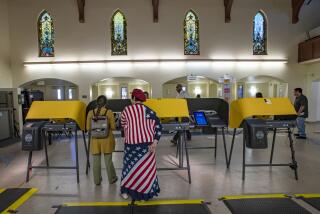A Tale of 2 Iraqis Ahead of the Vote
- Share via
BAGHDAD — Poll worker Hassan Muhawi will risk his life Sunday so other Iraqis can cast their ballots, but the chain-smoking father of 11 called the election a fraud and said he wouldn’t bother to vote.
Madhi Dhumd, a young police officer who will guard the same polling station, said he would exercise the right to vote and considered the election a turning point in Iraqi history.
On election day, the men -- both Shiite Muslims from the capital’s Sadr City slum -- will work side by side at one of more than 5,000 polling centers nationwide. Their views about the election, however, couldn’t be further apart, underscoring the deep ambivalence many Iraqis feel just days before the vote.
Muhawi will escort voters inside a schoolhouse converted into a polling station. Dhumd will work with Iraqi police outside the polling center. The two men met three months ago during planning meetings and became friends, but now they avoid discussions about the election to keep from offending each other.
“The elections are going to fail,” said Muhawi, one of 140,000 temporary election workers hired to support the vote. He will earn about $200 for two days’ work. That’s nearly double his monthly pay as a security guard at the Education Ministry.
“I’m doing this for the money,” said Muhawi, 53, shrugging his shoulders and flashing a tobacco-stained smile. “I don’t believe in the cause. But there is no work, and I need to take care of my family.”
Dhumd, 28, apologized for disagreeing with his older friend, but said election day was something he would one day tell his young children about.
“Of course I’m proud,” Dhumd said. “For the first time we are going to be able to choose the kind of government we want. It’s important and historic.”
Like many election workers, the men said they were aware that they faced risks by participating in Sunday’s vote. Insurgents have blanketed many cities with leaflets threatening to kill voters. Polling stations have been bombed. About a dozen election workers have been killed within the last two months, including three in Baghdad who were pulled from their car and executed in the street.
Several dozen poll workers have quit, particularly in restive cities such as Fallouja, Ramadi and Mosul.
Muhawi predicted that there would be few problems in Sadr City, a large, poor district in eastern Baghdad, where mainly Shiites live. “I’m not afraid,” he said. “Iraqis are like soldiers. We keep on going, even in the face of sacrifices.”
Unlike other election workers, Muhawi said he had not tried to hide his participation in the election from neighbors and friends. At the same time, he didn’t hide his belief that the elections were a farce.
The majority of candidates in the election, he says, are politicians who rode back into Iraq with U.S. tanks. “Can you name three candidates who have been living in Iraq in recent years?” he said. “They all come from outside.”
He noted that firebrand cleric Muqtada Sadr -- whose assassinated father is revered in Sadr City, which is named for him -- had announced that he would not participate in elections until U.S. forces left Iraq. Sadr’s position is in stark contrast to that of other Shiite clerics, who are urging followers to cast ballots and elect a Shiite-dominated government. “Muqtada Sadr is like our father,” Muhawi said. “If he is not going to vote, we’re not going to vote.”
Dhumd has a wife and three small children who aren’t happy that he’ll be working at the polling center. “They don’t want me to go, but it’s my duty,” he said. “I’m a cop.”
He said he was taking the decision about which slate to support very seriously. He planned to leave home early to cast a ballot before meeting Muhawi at the polling center.
But he wouldn’t say which slate of candidates would get his vote.
“I’m convinced this is a very important decision,” he said. “But it’s a personal decision.”
More to Read
Sign up for Essential California
The most important California stories and recommendations in your inbox every morning.
You may occasionally receive promotional content from the Los Angeles Times.













